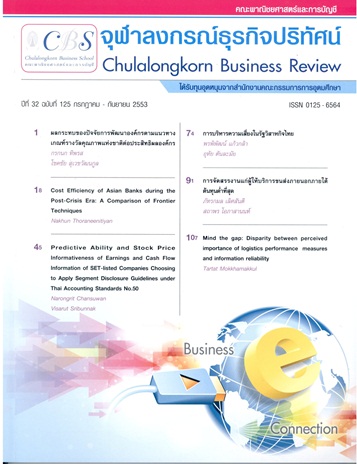Mind the gap: Disparity between perceived importance of logistics performance measures and information reliability
Main Article Content
Abstract
บทคัดย่อ
ปัจจุบันในการจัดการให้มีประสิทธิผลนั้น ธุรกิจมีความจำเป็นต้องพัฒนาระบบการวัดผล หนึ่งในปัจจัยที่จะประสบความสำเร็จได้คือการพิจารณาตัวชี้วัดที่เหมาะสมที่จะถูกประเมิน วัตถุประสงค์ของงานวิจัยนี้คือการเปรียบเทียบระบบการวัดผลทางโลจิสติกส์ของสองอุตสาหกรรมได้แก่อุตสาหกรรมไฟฟ้าและอุตสาหกรรมเหล็กโดยใช้การวิเคราะห์ความแตกต่างๆระหว่างความสำคัญและความน่าเชื่อถือของข้อมูล โดยตัวชี้วัดจะแบ่งตามกิจกรรมหลักของโลจิสติกส์อันประกอบไปด้วยการให้บริการลูกค้า สินค้าคงคลัง การจัดหา การขนส่งและคลังสินค้า การเก็บรวมรวบข้อมูลตามตัวแบบที่ได้มีการนำเสนอจะส่งไปยังบริษัทในอุตสาหกรรมดังกล่าว ผลของการศึกษาพบว่าอุตสาหกรรมแต่ละอุตสาหกรรมควรจะมุ่งเน้นในตัวชี้วัดที่แตกต่างกัน ระบบตัวชี้วัดควรจะมีการนำเสนอให้ตรงกับแต่ละอุตสาหกรรมเพื่อที่จะปรับปรุงการทำงานของบริษัท
Abstract
Nowadays, to achieve the effective management, it is very important for any business to develop the performance measurement system. One of the key success factors is the consideration of the appropriate performance measures to be evaluated. This purpose of the research is to compare logistics performance system on two industries which are Electronic and steel industries using gap analysis between importance and information reliability. The measures are categorized by major logistics activities including customer service, inventory, procurement, transportation, and warehousing. A survey based on the purposed model is conducted to the companies in the industries. From the survey, each industry has focuses on different performance measures. The measurement system should be proposed particularly for the industry in order to improve the company performance.
Article Details
Opinions and discussions in papers published by the Creative Business and Sustainability Journal (CBSJ) are deemed as personal opinions and the responsibility of the writers. They are not the opinions or responsibility of the Chulalongkorn Business School of Chulalongkorn University.
Papers, content, information etc. appearing in the Journal are deemed to be the copyright property of the Chulalongkorn Business School of Chulalongkorn University. Anybody or any organization that wishes to publish any part of them or use them in any way must obtain written permission from the Chulalongkorn Business School, Chulalongkorn University.


